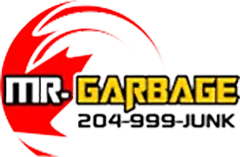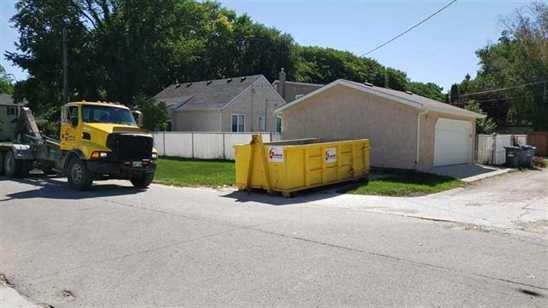Dealing with medical waste at home, whether it’s used sharps, expired medications, or materials from a home healthcare routine, raises real safety and legal questions. Homeowners in Winnipeg need clear, local guidance on medical waste disposal so they protect family members, sanitation workers, and the environment.
This practical guide covers everything Winnipeg homeowners should know about medical waste disposal: rules and guidance, how to safely contain and prepare items, where to take household medical waste locally, provincial stewardship programs, real-world examples, and how Mr. Garbage can help when professional handling is the safest option. Short sections, local references make this easy to act on today.
What is medical waste disposal?
Medical waste disposal covers the safe collection, handling, and final treatment or destruction of materials that could pose a biological or chemical risk.
At home, common categories include:
- Sharps (needles, syringes, lancets). These are high-risk because of puncture and blood-borne pathogen hazards.
- Unused or expired medications. Pharmaceuticals can harm wildlife or contaminate water if flushed or tossed.
- Contaminated dressings and bandages. Items soaked with blood or bodily fluids.
- Home-generated biohazardous materials. Small volumes of materials from wound care or diabetes management.
The goal of proper medical waste disposal is to prevent accidental injury, stop contamination of recycling or landfill streams, and ensure regulated items are handled in licensed facilities.
Why responsible medical waste disposal matters
Improper disposal has clear consequences.
- Public health risk: Sharps disposed of in household trash can injure waste workers and cause disease transmission.
- Environmental harm: Flushing medicines can introduce active compounds into water systems.
- Regulatory compliance: Biomedical or infectious wastes are regulated; improper disposal can lead to enforcement action.
- Community responsibility: Responsible disposal protects neighbours, pets, and local ecosystems.
Manitoba’s hazardous-waste frameworks and national guidance set expectations for how infectious and biomedical wastes should be identified and handled; homeowners are encouraged to follow these protocols rather than improvising.
Local rules & stewardship programs in Manitoba and Winnipeg
Winnipeg and Manitoba have clear programs and routes for household medical waste.
- Sharps and household medical waste stewardship: Manitoba participates in stewardship initiatives that provide approved collection routes for sharps and unused medications. These programs are designed for the residential stream and operate alongside municipal depots. Government of Manitoba
- City of Winnipeg 4R Depots: Residents can use designated 4R depots for certain household hazardous wastes. The depots provide a safe drop-off option for many items and are a central part of Winnipeg’s household hazardous-material strategy. Check the depot list and hours before you go.
- Biomedical waste classification: When sharps are known or believed to be contaminated with infectious material, they are regulated under hazardous waste regulations in Manitoba. Generators (including households in certain cases) must use approved collection and disposal routes. Government of Manitoba
If you’re unsure whether an item counts as “medical waste,” local health units or provincial guidance can help clarify before you act.
How to safely prepare medical waste for disposal at home
Follow a few simple rules to reduce risk before you leave the house.
Contain sharps securely
- Use an approved sharps container if possible. If not, a rigid, puncture-resistant plastic container (like a laundry detergent bottle) with a screw-on lid can be used temporarily.
- Clearly label the container “Sharps, Do Not Recycle” and keep it out of reach of children and pets.
- Never recap needles or bend them; the less handling, the safer.
Prepare unused medications
- Use a provincial or pharmacy take-back program when available. These programs are the safest route for household pharmaceuticals.
- If a take-back isn’t available immediately, keep medications in original packaging or sealed bag, out of reach of children, until you can use a stewardship drop-off.
Bag and separate contaminated dressings
- Put blood-soaked dressings in sealed plastic bags and clearly label them.
- Treat these as household hazardous materials and take them to a designated collection point or ask your provider for guidance.
These steps protect sanitation workers, recycling crews, and your family.
Where to take medical waste in Winnipeg
Winnipeg offers a few practical options for household medical waste.
4R Winnipeg Depots
The City’s 4R depots accept a range of household hazardous items. Check the specific depot’s accepted items list and hours before you travel; some depots accept sharps and household hazardous materials by appointment or under specified terms.
Pharmacy or stewardship take-back programs
Many Manitoba pharmacies participate in medication-return stewardship programs. These provide secure pharmaceutical takeback and ensure drugs are managed through licensed processors. Recent provincial plans and stewardship agreements outline the expansion of these services across Manitoba.
Licensed medical waste contractors
For larger volumes or special situations (for example, home healthcare with significant waste), licensed biomedical waste contractors provide pickup, transport, and final treatment options. These contractors operate under provincial hazardous-waste regulations and can provide chain-of-custody documentation.
If your household generates ongoing medical waste, contracting a licensed service or arranging regular pharmacy pickups is the safest long-term option.
Disposal of medical waste: What the regulations say
Canada and Manitoba provide guidance on biomedical waste handling.
- National guidance: The Canadian Council of Ministers of the Environment and federal biosafety guidelines outline how biomedical waste should be classified, managed, and treated. These national documents set minimum standards and inform provincial rules. Government of Canada Publications
- Provincial rules: In Manitoba, hazardous and infectious wastes (including certain sharps) fall under hazardous-waste regulations. The generator has responsibility for identifying and managing hazardous wastes appropriately; for households, the stewardship programs and municipal depots are the typical channels. Product Care Recycling
Following these rules avoids accidental exposures and ensures materials are processed in licensed facilities, reducing environmental and public-health risks.
Real-world examples
Practical examples show what to do.
Home diabetes care
Families managing diabetes generate sharps and used test strips. The right approach: store used sharps in an approved container and use pharmacy or municipal collection programs for drop-off. If regular pickups are needed, ask a licensed contractor about scheduled collection.
At-home wound care after surgery
Dressings soaked with blood should be bagged, labeled, and taken to household hazardous-waste collection points or managed via professional pickup in ongoing-care scenarios.
Expired medications
Rather than flushing, use pharmacy take-back or municipal programs to return expired pharmaceuticals to stewardship handlers. Many pharmacies partner in provincial programs that route drugs to appropriate destruction systems.
These straightforward steps protect waste workers and the environment while complying with local guidance.
When to call a professional medical waste disposal service
Some situations are best handled by licensed handlers.
- Large volumes from home healthcare: If a household generates frequent or heavy amounts of sharps and medical dressings, a professional service can schedule regular pickups and provide secure containers.
- Contaminated property after illness or biohazard event: Professional remediation may be needed for decontamination and safe disposal.
- Uncertainty about classification: If you can’t tell whether materials are regulated infectious waste, a licensed contractor can assess and recommend proper handling.
Mr. Garbage partners with licensed hazardous-waste carriers and can coordinate secure pickups and routing when homeowner situations require professional intervention. We provide documentation and ensure materials are sent to approved facilities. (Contact Mr. Garbage for guidance tailored to your situation.)
How licensed handlers process medical waste
Licensed biomedical and hazardous-waste contractors follow strict steps.
- Secure containment and labeling. Waste is packaged into approved containers that prevent leaks and punctures.
- Chain-of-custody documentation: Transport manifests and weight tickets show where waste was taken.
- Treatment or destruction: Options include incineration, autoclaving, or other validated processes under regulatory oversight.
- Final disposal or recovery: Treated residues are disposed of in accordance with provincial rules and landfill operating plans.
These controls are designed to protect workers, communities, and the environment throughout the waste’s lifecycle.
Local context: Brady Road and Winnipeg diversion
Winnipeg’s Brady Road Resource Management Facility plays a central role in processing municipal and special wastes.
The facility reports diversion rates and manages a range of waste streams. Recent facility reports show the city’s ongoing efforts to increase beneficial reuse and diversion of materials, reflecting that proper routing of special wastes (including regulated wastes) is part of broader local waste management. Partnering with haulers who deliver to Brady Road and the city’s depots helps ensure responsible handling.
When medical waste arrives at licensed processors or transfer stations, documentation allows for transparent tracking to these municipal systems.
Practical checklist: Safe medical waste disposal at home
Use this checklist to make a safe plan.
- Keep sharps in a rigid, puncture-resistant container and label it.
- Do not throw loose needles in regular trash or recycling.
- Use pharmacy or municipal take-back programs for medications.
- Bag and label contaminated dressings for the household hazardous drop-off.
- Contact a licensed contractor if you have ongoing waste or uncertain items.
- Keep records and receipts if you use professional pickup for estate or legal needs.
These steps keep households compliant and reduce public-health risks.
How Mr. Garbage supports safe medical waste disposal in Winnipeg
Mr. Garbage helps homeowners navigate medical waste disposal responsibly:
- Guidance and triage: We advise homeowners on what qualifies as household medical waste and which items need stewardship routes.
- Coordination with licensed partners: For regulated or larger-volume materials, we coordinate with licensed biomedical waste contractors to ensure compliant transport and treatment.
- Local knowledge: Our teams know Winnipeg depot hours and provincial stewardship arrangements, so we can point you to the right drop-off or arrange professional handling when required.
- Documentation: When we coordinate professional pickups, we supply the disposal paperwork you may need for estate records or healthcare reporting.
If you’re unsure how to handle home medical waste, contact Mr. Garbage for practical, local advice and, when needed, a professionally managed solution.
Frequently Asked Questions (FAQs)
Q1: How do I dispose of used sharps (needles) at home?
A1: Store used sharps in an approved sharps container or a rigid puncture-resistant plastic container with a screw lid. Label it clearly and use pharmacy take-back or municipal collection programs for disposal. For ongoing needs, consider a licensed pickup service.
Q2: Can I flush unused medication down the toilet?
A2: No, flushing can introduce active pharmaceutical compounds into waterways. Use pharmacy take-back programs or designated municipal collection points for safe disposal. Stewardship programs in Manitoba provide secure options for household pharmaceuticals.
Q3: Are home medical dressings considered medical waste?
A3: Soiled dressings and items with bodily fluids should be bagged and handled as household hazardous or bio-contaminated waste. Use municipal household hazardous drop-off programs or request professional pickup if volumes are significant.
Q4: What do I do if I find needles in my yard?
A4: Do not pick them up with your bare hands. Use thick gloves and a puncture-resistant container, or contact municipal services or a licensed contractor for safe removal. Report needles in public places so authorities can handle them safely.
Q5: When should I call a licensed medical-waste contractor instead of using depot drop-offs?
A5: If you generate regular volumes of medical waste (for example, long-term home healthcare), if materials are confirmed infectious, or if you need chain-of-custody documentation, engage a licensed contractor for scheduled pickups and compliant transport and treatment. Mr. Garbage can coordinate such services with licensed partners.
Conclusion
Safe medical waste disposal at home protects families, sanitation workers, and the environment. Winnipeg homeowners should use pharmacy take-back programs, municipal 4R depots, and provincial stewardship channels for household sharps and medications. When volumes or risks exceed occasional use, a licensed contractor, coordinated by a local partner like Mr. Garbage, ensures compliant, documented handling.
If you’re unsure how to dispose of a specific item, or if your household requires regular pickups or professional handling, contact Mr. Garbage for local guidance and secure coordination with licensed biomedical waste handlers. We’ll help you choose the safest, most compliant route so your household stays healthy and your community stays protected.

